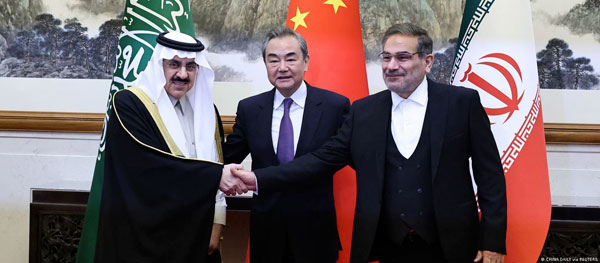Iran-Saudi Arabia détente Its costs for Zionist Regime
The recent détente between Iran and Saudi Arabia with the mediation of the Chinese government has had widespread reactions at the regional and international levels. One of the most important reactions came from media and heads of the Zionist regime. Regardless of the reactions, it seems very important and interesting to examine the costs and consequences of the aforementioned agreement for the Zionist regime. In the following lines, the effects of this agreement on the Zionist regime are discussed.
Reactions
One of the fastest reactions to this agreement was made by the opposition faction of Netanyahu's cabinet. Naftali Bennett, Yair Lapid and Benny Gantz were among the people who reacted in this regard. In general, this agreement was met with anger and criticism by the Israelis, who considered it the result of Netanyahu's preoccupation with internal issues and neglect of Iran, as well as America's focus on Ukraine and China. After this incident, the Israelis consider Iran as impossible to isolate and see their Iranophobia plan forsaken. But on the other hand, the Palestinian authority considered this agreement to be the cause of stability, security and cooperation among the countries of the region. In addition, Palestinian militant groups also welcomed this agreement.

China brokers a diplomatic thaw between Saudi Arabia and Iran
The costs of this agreement for the Zionist Regime
Only the Israelis explicitly expressed their displeasure with this agreement and considered it against their goals and interests. In other words, this agreement will entail costs for the Zionist regime, which include:
- The failure of the Iranophobia project: During the last decade, by abusing the Syrian crisis, the Zionists managed to practically turn the Syrian crisis into a basis for new divisions in regional convergences in West Asia. The Israelis came out of this crisis looking for ambitious plans, such as the Arab NATO or the air defense coalition plan. In addition, the American government also transferred the Zionist regime from the European command to the Centcom command. Also, it is not an exaggeration if we assume Abraham's agreement and the progress of the normalization project in the shadow of the events of the last decade. If the Israelis would move with the same intensity and track record, they would naturally see new results and achievements for themselves.
- The possibility of reducing the presence of the Zionist regime in the Persian: Since the presence of the Zionists in the Persian Gulf was defined mainly as a military and security presence against the Islamic Republic of Iran, and following the agreement between Iran and Saudi Arabia, we will see a de-escalation of tension in the Persian Gulf, as a result of which, the Israelis will arguably and logically be disarmed for greater presence in the Persian Gulf.
- The increase in Netanyahu's problems: Currently, while he is facing an internal crisis caused by the reform of the judicial system, with this agreement signed, he is witnessing the failure of one of the priorities announced in the elections. Netanyahu announced that confronting Iran and normalization with Saudi Arabia are among the priorities of his new cabinet, but in the current situation, both of these priorities have faced a serious challenge.
- The impasse in the Arab-Israeli normalization process is another consequence: Regardless of the fact that the US government is facing new priorities such as the Ukraine crisis and competition with China, and unlike Trump, it is not very eager to help Netanyahu solve his problems, the de-escalation of Iran-Saudi relations also creates a serious obstacle in the progress of the Abraham Accords.
- The failure of Iran's isolation project: After the Republic of Azerbaijan and the Kurdistan Region, the Israelis hoped to find a foothold in the Persian Gulf region to confront the Iranian government and isolate it, but with the reduction of tension in the Persian Gulf region and the diminution of the presence of the Zionists in this blue zone, practically, the issue of Iran's isolation also seems to be weakened and defeated once again.
- The failure of the offensive project against Iran: The Israelis have always talked about the possibility of an imminent military attack on Iran's nuclear and strategic centers. Naturally, using the Saudi air space for military aggression is the most important routes of Zionist fighter attacks, which naturally, with the recent agreement between Iran and Saudi Arabia, this aggressive project will also face failure.
-
Still No Comments Posted.















Leave Comments